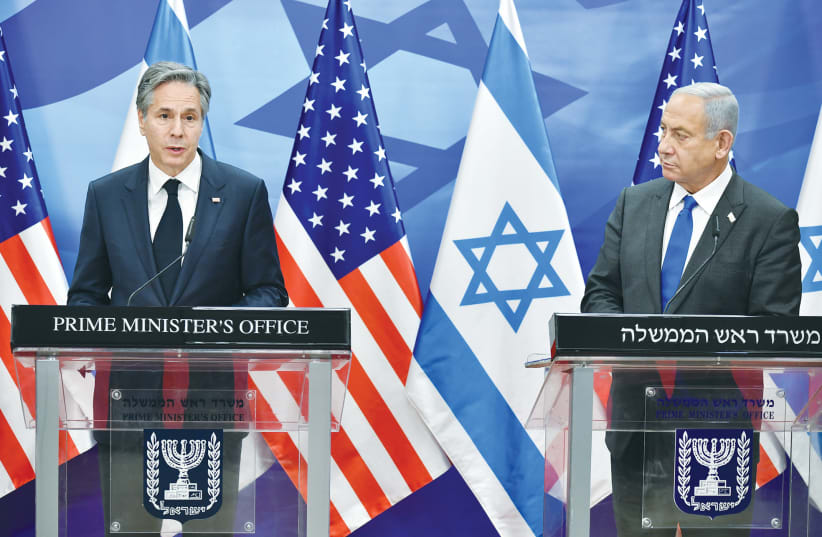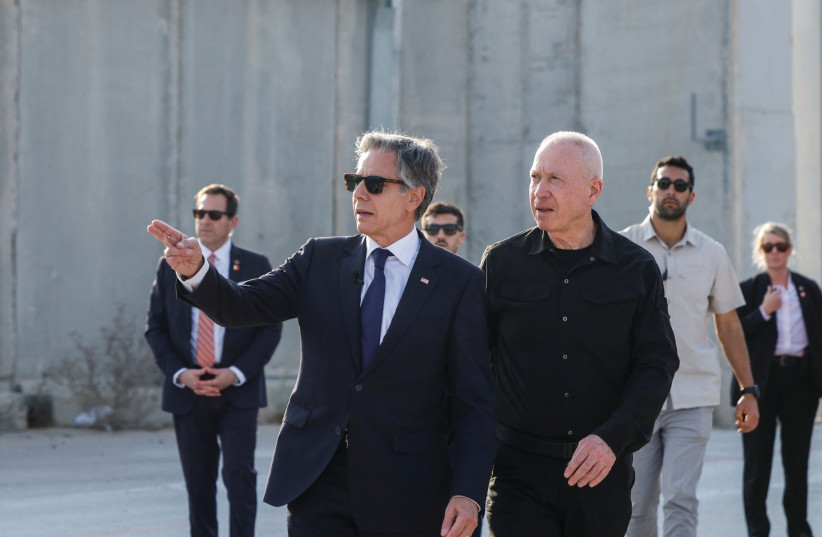US Secretary of State Antony Blinken warned Israel on Wednesday not to reoccupy Gaza, to refrain from a major Rafah operation, and to finalize a day-after plan for the enclave, as he spoke to reporters in Kyiv.
“When it comes to the future of Gaza, we do not support and will not support an Israeli reoccupation,” Blinken said, amid a bitter row between Jerusalem and Washington over the Gaza war.
Blinken said that he did not support Hamas governance in Gaza, but there also can’t be anarchy and a vacuum that’s likely to be filled by chaos.
A clear plan is needed
“That only underscores the imperative of having a clear, concrete plan for the day after the conflict in Gaza – in terms of governance, in terms of security, in terms of rebuilding Gaza for its people. And here it would be important for Israel to focus on that as well,” he said.
Blinken had spoken with Defense Minister Yoav Gallant on Monday to discuss Gaza. In Jerusalem on Wednesday, Prime Minister Benjamin Netanyahu was also at odds with Gallant, who took him to task for failing to approve a day-after plan, a step he said had only prolonged the military conflict in the enclave.
In a scathing public critique, he stated that Netanyahu’s indecision had eroded “our military achievements, lessen[ed] the pressure on Hamas, and sabotage[d] the chances of achieving a framework for the release of hostages.”
He called on Netanyahu to “make a decision, and declare that Israel will not establish civilian control over the Gaza strip, that Israel will not establish military governance in the Gaza strip, and that a governing alternative to Hamas in the Gaza strip will be raised immediately.”
Netanyahu defended his position by taking his case to both the US and Israeli public, in a situation where he appeared increasingly isolated on both the domestic and international stage.
He spoke in advance of US National Security Adviser Jake Sullivan’s anticipated visit here this week to discuss Gaza and the US’s opposition to a major Rafah operation, as it argues that Hamas is best defeated diplomatically and not militarily.
In an interview with CNBC, Netanyahu stressed that those who want Israel to halt its military campaign in Gaza and refrain from a major Rafah operation to destroy the four Hamas battalions there, are empowering the terror group.
“Those who tell us stop the war now” and to “leave those four battalions in Rafah are saying ‘Enable Hamas to regroup, recapture Gaza and threaten [Israel] again;’ that’s not going to happen,” he said.
Once the war is over, Gaza should be governed by a “non-Hamas civilian administration,” but the IDF would retain military responsibility, he said.
He similarly told his government that he had attempted to replace Hamas with an alternative local governance when it came to food distribution.“One hundred days ago, I directed the security echelon to allow local Gazans, who are not identified with Hamas, to be integrated into the civilian management of food allocation in Gaza,” Netanyahu said.
“This attempt has not been successful because Hamas has threatened them and even hurt some of them in order to deter others,” he stated.
It is not possible to put in place a local alternative to Gaza, as long as Hamas remains there, he said.
“Until it is clear that Hamas does not control Gaza militarily, nobody will be prepared to take upon himself the civil management of Gaza out of fear for their lives.
“Therefore, all the talk about ‘the day-after’, while Hamas stays remains intact, will remain mere words devoid of content,” he said.
The day after
He pushed back at criticism of his government’s failure to put in place a day-after plan, explaining that “contrary to what is being claimed, for months, we have been engaged in various efforts to resolve this complex problem,” some of which were covert, he explained.
“There is no alternative to military victory. The attempt to bypass it with this or that claim is simply detached from reality. There is one alternative to victory – defeat, military, diplomatic, and national defeat. My government will not agree to this,” he said.
In his interview with CNBC, he stressed in particular his position on Palestinian statehood, which, coming in the aftermath of the Hamas invasion of Israel on October 7, would be a reward to terror, he argued. The US has said it wants Israel to promise to leave Gaza once the war is over and support Palestinian statehood.
The “two-state solution that people are talking about, basically would be the greatest reward for the terrorist that you can imagine,” Netanyahu said.
“It would be a state that would be immediately taken over by Hamas and Iran. And it wouldn’t advance the purposes of peace. It would just be a launching ground for a future war against Israel,” he said.
Netanyahu repeated his long-standing position for autonomous Palestinian governance that is not full sovereignty.
The Palestinians should have all the powers that they need to govern themselves, and none of the powers that could threaten Israel’s survival, he explained.
Israel must maintain military responsibility for those areas, he said.
Israeli has learned that when it withdraws from territory, Iranian-backed proxies move in, he said.
In a separate video he released in Hebrew, Netanyahu took issue in particular with a Palestinian run by the Palestinian Authority, noting that he did not want to “replace Hamastan with Fatahstan.” Earlier in the day, he instructed Justice Minister Yariv Levin to collect suggestions from the ministers on ways to weaken the PA.
During his interview with CNBC, he downplayed the tensions with the US, noting that he appreciated the support Israel had received from Washington and US President Joe Biden.
“Yes, we do have a disagreement on Gaza and rather on Rafah, but we have to do what we have to do. And, you know, sometimes you have to, you just have to do what is required to ensure your survival in your future,” he said.


